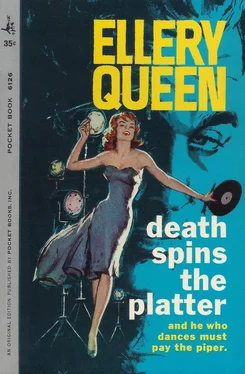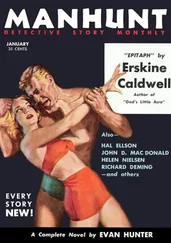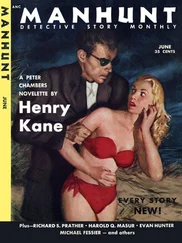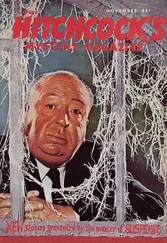Layton’s speculations were shattered by the blow of a voice roaring for quiet.
“Thirty seconds.”
All sounds ceased. Then a red light on the camera focused upon Tutter King suddenly glowed.
The smile of boyish charm lit up King’s smooth, clean face on the split second of the red light’s appearance.
“Afternoon once again, drakes and ducklin’s, and welcome to The King’s Session, presented each weekday at this same time by KZZX-TV, and brought to you by the fine products we’ll mention from time to time during the next two hours.”
The famous King smile began to dim as the frank, manly voice paused. “As most of you probably know,” the disc jockey continued, letting the smile come up again bravely, “this is the final TV appearance of yours truly. I’d be worse than a fool, I’d be ungrateful, if I took any credit for the wonderful success of The King’s Session during the past five years. For that you wonderful fans out there — you kids in the studio” — the dance-floor camera came on, panning slowly — “you wonderful kids—” at the stricken young faces, and then camera number 1 returned Tutter King’s image to the monitors — “are entirely responsible. Thank you. Thank you.” His voice broke ever so little, and the silence in the studio suddenly became charged with tension.
But then Tutter King squared his shoulders and said in a strong voice, “But I don’t intend to play any funeral marches today! We’re going to have a happy time. Aren’t we, colts and fillies?”
A vast “YES” rattled the microphones.
“You bet! Later in the program I want to introduce the various members of my staff, all the technicians, who’ve worked so hard and anonymously to make these sessions so popular... and at the very end...”
Layton watched King’s face closely. A nerve at the corner of the boyish mouth was making a tiny muscle quiver ever so slightly.
“... and at the very end I’m going to make an important statement.”
The smile that King was summoning back came, Layton thought, with uncharacteristic reluctance.
“But right now, cats and kittens, it’s back to the old baton and... Music, please!”
He raised his arms, one hand poising a baton, and nodded to Lola Arkwright. But before the red-haired girl could apply the turntable arm to the record, the studio exploded.
The bespectacled president of the Tutter King Fan Club had done his work well. Applause, whistles, cheers, the high-pitched yells of the girls took over the air waves. Wayne Mission and Nora Perkins were standing dangerously on folding chairs, stage-managing the demonstration. One block of boys, at young Mission’s further signal, began stamping on the dance floor in perfect unison. Above the pandemonium individual voices, hysterical with excitement, rose in screams of “We — want — Tutter, we — want — Tutter!” until, infecting the others, all other sounds turned into a vast chanted thunder: “WE — WANT — TUTTER!”
King’s lips were moving, but his voice was drowned in the tidal wave of noise. He tried to quiet them with gestures, half-smiling, half-serious. But they paid no attention to him; and finally he dropped his arms and shrugged helplessly into the camera.
Layton turned his own camera eye on the Studio A control room. It was the scene of a fierce argument in pantomime, obviously over whether to cut the program off the air. He saw the director snatch a telephone, listen, then nod, cut the connection, and sit back in resignation. The station brass — Layton wondered whether it was Hathaway himself — had decided to ride out the storm rather than risk studio devastation.
King began gesturing again, pleading into his microphone. Gradually his voice became audible, “Kids... kids... kids...” and then, as suddenly as it had begun, the noise stopped. Layton saw Wayne Mission step off his chair and sit down on it, folding his arms.
“Thank you,” Tutter King said huskily, “thank you, geese and goslin’s, for a demonstration of loyalty I’ll remember all the rest of my life. If you were trying to break me up, you darn near succeeded!
“But time’s a-wastin’, as the fellow said,” King continued briskly, nodding to the control room, “so — on with the dance! But first,” he went on, reading the teleprompter, “here’s an important message from Plush, the Soap That’s in Love with Your Skin. Ladies, are your hands red and unsightly from the strong detergents and bleaches in common household use today? Do you find yourself trying to hide them under the tablecloth when that Man in Your Life takes you out to that divine dining place you’ve so looked forward to? Then take my advice and listen to this suggestion.”
The red light on camera 1 blinked out and a commercial film took Tutter King’s place on the monitor screens. Layton kept watching the teenagers. They were paying no attention to the commercial. They simply stood and sat around, suspended in time, waiting for something he was unable to fathom. And King... King was waiting with them. Then the commercial went off, and camera 1’s light went on again, and King raised his baton again, and Lola Arkwright spun the first platter, and the dancing began.
It was a long, deadly session for Jim Layton; he had never been so bored in his life. King’s patter in introducing the records seemed to him cliché ridden, unbright, and unfunny; the red-haired girl tended the turntable like an automaton; the dance-floor camera kept recording the activity on the floor, such as it was. The dancing had a stylized lifelessness, the dancers a lack of facial expression, that reminded Layton of a congress of zombies, with Tutter King as the mad scientist. Sometimes King sauntered on to the floor with a portable microphone to chat with this zombie couple or that; sometimes he introduced a commercial; occasionally the perky redhead joined him in both conversations and commercials.
The prevailing dullness was too much for some of the adults near the door; after the first quarter-hour three of them rose and left. The well-dressed woman with the glossy black hair was not one of them. She scarcely moved during the entire first hour; her slender gloved hands remained quiescent in her lap; she simply kept sitting there, rigid. Layton, keeping out of camera range, maneuvered himself around the studio for a closer look at her. He had judged her from across the studio to be in her mid-twenties. He now saw that she was at least thirty, perhaps older.
At the four-o’clock station break there was a ten-minute interlude for a newscast. King reminded his viewers with a cheery smile to stay tuned for the second portion of his show and the “surprise announcement” he had promised before his sign off; the red light on his camera vanished; Studio A went off the air; the teenagers immediately broke into animated conversation, laughing and horsing around, as if the blinding of the cameras’ eyes had lifted the spell that had bewitched them; and Tutter King with utter self-effacement slipped like a thin shadow through the door marked Studio Employees Only, and disappeared.
Lola Arkwright slipped out directly after King.
The woman with the black hair stirred. She hesitated for perhaps fifteen seconds. Then, without warning, she jumped to her feet, ran to the door, opened it swiftly, and disappeared also. Layton could not have been more startled if she had suddenly yelled, “Allay-oop!” and done a handstand on the back of her chair.
By the time he was able to push through the densely clustered groups chattering on the dance floor and follow her into the corridor, she was gone.
Not only was there no sign of her in either arm of the L-shaped hall, but the disc jockey and his girl Friday had vanished, too.
Читать дальше








![Ричард Деминг - Whistle Past the Graveyard [= Give the Girl a Gun]](/books/412176/richard-deming-whistle-past-the-graveyard-give-t-thumb.webp)


